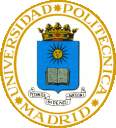

Camino de la Arboleda, s/n 28031 - MADRID (España)
email:

Tfno. y fax: (+34) 91 336 78 01

|
Grupo de Diseño Electrónico y Microelectrónico |

|
||
|
Universidad Politécnica de Madrid Camino de la Arboleda, s/n 28031 - MADRID (España) |
CITSEM email: 
|
Dpto. de Ingeniería Telemática y Electrónica Tfno. y fax: (+34) 91 336 78 01 |
||
|
ABOUT US The "Grupo de Diseño Electrónico y Microelectrónico" (Electronic and Microelectronic Design Group), GDEM, was established in 1996 as a research group in the Control and Electronic Systems Department (at present Department of Telematic and Electronic Engineering - DTE), of the "E.U. de Ingeniería Técnica de Telecomunicación" (Technical Engineering School of Telecommunication), at present "E.T.S. de Ingeniería y Sistemas de Telecomunicación" (Technical School of Telecommunication Engineering and Systems), ETSIST, of the "Universidad Politécnica de Madrid" (Technical University of Madrid), UPM. The GDEM is a Recognized Research Group since 2005, after the first official call for this purpose within the UPM. In 2011, the GDEM was one of the founder groups of the Research Center on Software Technologies and Multimedia Systems for Sustainability (CITSEM), to which it belongs since then. The CITSEM web includes now the updated information of GDEM. The GDEM is involved from its establishment in R&D projects about electronic and microelectronic design for different companies, using modern design methodologies -hardware description languages (HDLs), logic synthesis- and with the technology that is best suited for each application: programmable logic devices (PLDs, FPGAs), application specific integrated circuits (ASICs), microprocessors, microcontrollers and DSPs. The GDEM research activity is focussed on electronic and microelectronic design applied to audio and video coding and decoding, digital TV, IP data transmission over digital broadcasting networks and optimization of power/energy consumption on handheld multimedia terminals. Moreover, the group is involved in other research lines: estrategic decision making from methodologies of technological surveillance and/or prediction, augmented reality and ambient intelligence technologies for smart cities and multiprocessor achitectures for software radio applications. Some of the results of these activities have been published in national and international conferences. The GDEM is also involved in training activities and organizes postgraduate courses and courses for companies and public institutions. The GDEM staff includes permanent researchers (doctors and engineers), scholars, Master Thesis students and administrative staff. |